
International Journal of Communication
Scope & Guideline
Championing high-quality research in communication.
Introduction
Aims and Scopes
- Interdisciplinary Communication Research:
The journal encourages research that spans various disciplines, integrating perspectives from sociology, cultural studies, media studies, political science, and technology studies to understand communication phenomena in diverse contexts. - Impact of Digital Media on Society:
A core area of focus is the examination of how digital media platforms influence social interactions, political engagement, cultural production, and public discourse, particularly in the context of globalization and technological advancements. - Critical Analyses of Media and Communication:
The journal publishes critical analyses that interrogate the role of media in shaping public perceptions, ideologies, and social movements, with an emphasis on issues of power, representation, and inequality. - Crisis Communication and Public Health:
Research addressing communication strategies during crises, such as public health emergencies (e.g., COVID-19), is a significant area, highlighting the importance of effective messaging and community engagement. - Cultural and Political Communication:
The journal explores the intersections of culture and politics, examining how communication practices contribute to identity formation, activism, and the negotiation of power dynamics in various societal contexts. - Media Literacy and Misinformation:
With the rise of misinformation and disinformation, the journal emphasizes research on media literacy, critical thinking, and the role of communication in combating false information. - Global and Transnational Perspectives:
The journal seeks to incorporate global perspectives, particularly from underrepresented regions, to enrich the understanding of communication practices and media systems worldwide.
Trending and Emerging
- Digital Activism and Social Movements:
Research exploring the role of social media in facilitating activism and social movements, particularly in contexts of political unrest and social justice, has gained significant traction. - Algorithmic Culture and Data Privacy:
There is a growing emphasis on the implications of algorithms and data privacy in communication, examining how algorithmic decision-making affects individual agency and societal norms. - Health Communication in Crisis Situations:
The COVID-19 pandemic has led to an increased focus on health communication strategies, particularly how information is disseminated and perceived during health crises. - Intersectionality and Communication:
Emerging studies are increasingly addressing intersectionality, exploring how various identities (e.g., race, gender, class) intersect and influence communication practices and experiences. - Platform Studies and Mediated Communication:
Research centered on the role of digital platforms (e.g., TikTok, Instagram) in shaping communication practices and content creation is on the rise, reflecting the growing importance of these platforms in everyday life. - Misinformation and Disinformation Studies:
The challenges posed by misinformation and disinformation have prompted a surge in research focused on understanding the mechanisms behind misinformation spread and strategies for effective communication. - Cultural Representation in Digital Spaces:
There is an emerging focus on how cultural narratives and identities are constructed and represented in digital spaces, particularly in relation to marginalized communities.
Declining or Waning
- Traditional Media Analysis:
There appears to be a waning focus on traditional media analysis, such as print journalism and broadcast television, as researchers increasingly turn their attention to digital and social media platforms. - Historical Media Studies:
Research that emphasizes historical perspectives on communication, while still relevant, has seen a decrease in frequency, possibly overshadowed by more contemporary issues related to digital transformation. - Local News Coverage:
The emphasis on local news and its impact on community engagement has diminished, likely due to a broader focus on global and transnational communication issues. - Theoretical Frameworks from Previous Decades:
Some theoretical frameworks that dominated earlier scholarship, such as agenda-setting and cultivation theory, seem to be less frequently applied in favor of newer, more dynamic models that account for the complexities of digital media. - Gender Studies in Media:
Although gender studies remain important, the specific focus on traditional gender roles in media representation has seen a decline, possibly due to a more intersectional approach that encompasses a wider range of identities and experiences.
Similar Journals
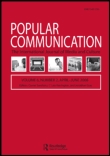
Popular Communication
Shaping the Future of Popular Communication ResearchPopular Communication, published by Routledge Journals, Taylor & Francis Ltd, is a leading academic journal in the field of Communication, recognized for its Q1 ranking in the 2023 Scopus category. With an ISSN of 1540-5702 and an E-ISSN of 1540-5710, this journal has been converging significant research from 2010 to 2024, highlighting contemporary trends and evolving dynamics in popular communication practices. The journal is based in the United Kingdom and focuses on the intersection of media, culture, and communication, making it a vital resource for researchers, professionals, and students interested in understanding the impact of communication in society today. Although it does not offer Open Access options, it remains a cornerstone for scholarly discourse, with an impressive rank of #96 out of 511 in Social Sciences Communication, placing it in the 81st percentile. Contributions to this journal play a critical role in advancing knowledge and encouraging further scholarship in the diverse realm of popular communication.
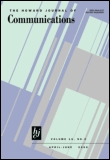
Howard Journal of Communications
Advancing communication scholarship through rigorous research.The Howard Journal of Communications, published by Routledge Journals, Taylor & Francis Ltd, is a leading academic journal dedicated to advancing the field of communications. With a strong focus on both theoretical and practical elements, it has established itself as a vital resource for researchers, professionals, and students since its inception in 1988. The journal holds a prestigious Q2 ranking in the categories of Communication and Strategy and Management for 2023, positioning it among the top publications in these fields. The Scopus ranking also highlights its importance, with a notable rank of #158 in Social Sciences Communication and #268 in Business, Management and Accounting. Although the journal does not offer open access at this time, its comprehensive scope and commitment to quality scholarship ensure it remains an essential platform for disseminating innovative research and ideas in the rapidly evolving landscape of communication studies. Located in the United Kingdom, the journal continues to foster interdisciplinary dialogue and enhance academic discourse within these vital disciplines.
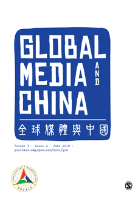
Global Media and China
Pioneering Research at the Crossroads of Media and CultureGlobal Media and China, published by SAGE Publications Ltd, is an esteemed open-access journal dedicated to fostering scholarly dialogue and research in the rapidly evolving dynamics between global media and Chinese communication practices. Launched in 2016, this journal has rapidly ascended within the academic community, achieving a remarkable Q1 ranking in both the Communication and Cultural Studies categories as of 2023, and holding significant positions in the Scopus rankings at the 95th and 81st percentiles respectively. Situated in the United Kingdom, the journal serves as a crucial platform for researchers, professionals, and students seeking to explore the intricate intersections of media influence, cultural policies, and communication trends originating from China. With a clearly defined scope and a commitment to open-access publication, Global Media and China is poised to continue its impactful contribution to global conversations surrounding media studies and cultural contemporary issues through to 2024 and beyond.
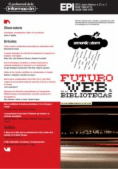
Profesional de la Informacion
Exploring Innovative Research in Cultural StudiesProfesional de la Informacion is a leading academic journal dedicated to advancing research in the fields of Communication, Cultural Studies, Information Systems, and Library and Information Sciences. Published by EDICIONES PROFESIONALES INFORMACION SL-EPI, this journal has established itself as a pivotal resource for scholars and practitioners alike since its inception in 2006, holding an impressive Q1 ranking across its categories in 2023. With an impactful presence reflected in its Scopus Rankings—33rd out of 511 in Communication and 26th out of 280 in Library and Information Sciences—Profesional de la Informacion provides a forum for innovative research and discussion. Although it operates under a subscription model, the journal’s commitment to quality research contributes significantly to the knowledge base within its fields, making it an essential read for those who are passionate about information and communication studies. Positioned in the vibrant academic landscape of Barcelona, Spain, this journal encourages submissions that explore contemporary challenges and advancements in these vital areas of study, solidifying its role as a cornerstone of scholarly discourse.

Media International Australia
Elevating Understanding of Media's Societal ImpactMedia International Australia is a leading journal that occupies a unique position at the intersection of communication and cultural studies. Published by SAGE Publications Ltd, this journal has established itself as a vital platform for scholarly discourse since its inception, now converging efforts from 2008 to 2024. With an impressive Q1 ranking in both the Communication and Cultural Studies categories, it ranks 12th out of 1304 in Cultural Studies and 42nd out of 511 in Communication, placing it within the 99th and 91st percentiles respectively according to Scopus metrics. The journal is committed to providing access to rigorous research that reflects contemporary issues in media, making it essential reading for researchers, professionals, and students keen on advancing their understanding of media's role in society. Despite not being fully Open Access, it ensures that quality research remains accessible through institutional subscriptions, allowing a broad audience to benefit from its insightful contributions.

Plaridel
Advancing Communication Scholarship, One Insight at a Time.Plaridel is an esteemed academic journal dedicated to the field of communication, published by the University of the Philippines Diliman. With the ISSN 1656-2534, this journal embraces a significant role in fostering scholarly dialogue and advancing research within the rapidly evolving landscape of communication studies. As one of the platforms in the Philippines, it aims to uplift local and international discourse by featuring innovative research, critical reviews, and theoretical explorations relevant to various facets of communication. Although currently rated in the Q4 quartile for 2023 in the Communication category, Plaridel's commitment to quality and scholarly rigor reflects a promising trajectory for future impact. The journal has been operational since 2018 and welcomes a wide array of contributions, especially from emerging scholars. Open access provides greater accessibility to researchers and enthusiasts, promoting broader engagement with the journal’s content. Plaridel holds an important place within the academic community, aspiring to elevate standards of communication research and practice in the Philippines and beyond.

Tripodos
Advancing Knowledge in Communication StudiesTripodos is a prominent open-access journal published by UNIV RAMON LLULL, FAC CIENCIES COMUNICACIO BLANQUERNA in Spain, dedicated to advancing the field of communication studies since its establishment. With an ISSN of 1138-3305 and an E-ISSN of 2340-5007, Tripodos has gained recognition for publishing high-quality research articles that examine diverse aspects of communication in contemporary society. The journal has successfully transitioned to open access since 2006, ensuring that its valuable contributions are readily available to a global audience. As of 2023, Tripodos holds a Q3 ranking in the Communication category according to Scopus, reflecting its growing influence within the academic community, ranking 187 out of 511 journals and positioning itself in the 63rd percentile. This journal serves as an essential platform for researchers, professionals, and students who are eager to explore the dynamic field of communication and its impact on society.

Central European Journal of Communication
Fostering Insightful Dialogue in Communication StudiesCentral European Journal of Communication, published by the Polish Communication Association, is a pivotal resource in the field of communication studies. Since its inception, this journal has become a significant platform for scholarly discourse, contributing valuable research and insights that span the diverse landscape of communication. With its current classification in the Q3 quartile of the communication category and a ranking of #315 out of 511 in Scopus, it is positioned to foster growth in communication research and practice within Central Europe and beyond. The journal invites submissions that explore a wide array of topics pertinent to communication, ensuring a robust dialogue among researchers, professionals, and students alike. Although currently operating under traditional access formats, the journal aims to enhance visibility and engagement by prioritizing quality content that addresses contemporary issues in communication, making it an essential resource for those looking to deepen their understanding of this dynamic field.
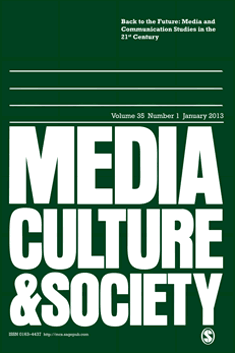
MEDIA CULTURE & SOCIETY
Exploring the Intersections of Media and Cultural DynamicsMEDIA CULTURE & SOCIETY, published by SAGE PUBLICATIONS LTD, is a prominent academic journal dedicated to the interdisciplinary exploration of media, culture, and societal dynamics. With a long-standing history since its inception in 1979 and extending to 2024, this journal serves as a vital platform for researchers, professionals, and students interested in understanding the complex interplay between media and cultural phenomena. Operating from the United Kingdom, it holds a prestigious Q1 ranking in both communication and sociology/political science categories, reflecting its significant impact within these fields. The journal’s Scopus ranks further attest to its excellence, placing it in the top percentiles and making it an essential resource for advancing scholarly discussions. While not open access, MEDIA CULTURE & SOCIETY continues to provide insightful analyses that shape contemporary discourse on the role of media in society, ensuring its relevance and importance to academic communities worldwide.

Communication Reports
Exploring the nuances of communication across disciplines.Communication Reports is a premier academic journal dedicated to advancing the field of communication studies. Published by Routledge Journals, Taylor & Francis Ltd, this influential journal has successfully contributed to the academic discourse since its inception, with converged publication years from 1988 to 1995 and from 2005 to 2024. With an impressive impact in its categories—achieving a Q1 ranking in Communication and Linguistics, as well as a Q2 ranking in Education—it stands as a vital resource for researchers and practitioners alike. The journal consistently publishes high-quality research that tackles diverse aspects of communication, creating an intellectually stimulating platform that encourages insightful discussions and innovative ideas. Despite not being an Open Access journal, its extensive reach and reputable scholarly contributions make it an invaluable asset for anyone committed to understanding the nuances of communication in today’s complex world. The journal is based in the United Kingdom, at 2-4 Park Square, Milton Park, Abingdon OX14 4RN, Oxon, England.